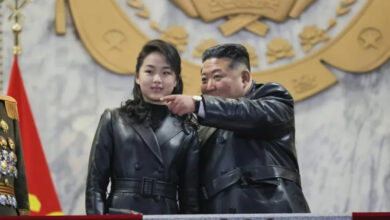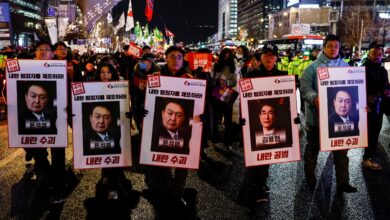
South Korean President Yoon Suk Yeol has been arrested for questioning, according to the country’s anti corruption agency, in the latest chapter of a weekslong political saga that began with the embattled president’s shock martial law decree last month.
Yoon was arrested for questioning Wednesday morning and left his residential compound with investigators in a motorcade – the first time such an action has been taken against a sitting president in South Korea.
Yoon is wanted for questioning in multiple criminal investigations related to his short-lived declaration, including over accusations of leading an insurrection – a crime punishable by life imprisonment or even the death penalty.
As of Wednesday evening, Yoon had refused to answer investigators’ questions or comment, and had refused to allow the sessions to be recorded, an official with the Corruption Investigation Office for High-Ranking Officials (CIO) told reporters.
Yoon is expected to be moved from the CIO headquarters to a nearby detention center, where he will be held overnight in solitary confinement “due to safety reasons,” the facility told CNN.
The embattled president had been holed up in his fortified residence for weeks surrounded by his Presidential Security Service team, evading arrest as he faces several probes and an impeachment trial.

The Corruption Investigation Office (CIO), which is working with police and the defense ministry to investigate Yoon, first attempted to detain him earlier this month, but it failed after an hours-long showdown in which soldiers and members of the presidential security detail blocked some 80 police and investigators from approaching the presidential compound.
Following his arrest Wednesday, Yoon released a video message dismissing the investigations into him as “illegal” and said “rule of law in this country has completely collapsed.” He said he cooperated with investigators to prevent violent clashes.
“As a president who must protect the constitution and legal system of the Republic of Korea, responding to these illegal and invalid procedures is not an acknowledgment of them, but in the hopes of preventing unsavory bloodshed,” he said.
The warrant allows investigators to hold Yoon for up to 48 hours from the time he was detained, until around 10 a.m. local time Friday. The CIO would need to apply for an arrest warrant within that period to detain him further.
Groups of supporters and opponents of Yoon were both at the scene Wednesday, with videos from Reuters and CNN affiliate YTN showing demonstrators pulling up in buses and gathering in the streets around Yoon’s compound, despite sub-zero conditions.
Some demonstrators could be heard chanting “resign,” “your time is up” and “take responsibility,” while supporters of the embattled president chanted “invalid impeachment,” “free ROK, hurrah!” and “we won!”
Many of those backing the leader – widely seen as a conservative firebrand and staunch US ally tough on China and North Korea – also held signs with the phrase “Stop the steal” printed in English, while others waved American flags.

A YTN video showed a large sign on the back of one bus that read “Insurrection Department – Yoon Suk Yeol” in Korean – a slogan typical of anti-Yoon protests since the president launched his martial law decree last month.
A court approved a warrant to detain the president earlier this month after Yoon, a former prosecutor, refused to answer three summonses by investigators in recent weeks asking for his cooperation, according to the CIO.
Martial law declaration
Yoon declared martial law in a surprise late-night address on December 3, claiming opposition lawmakers had “paralyzed state affairs” and that the move was necessary to “safeguard a liberal South Korea” from the threats posed by “anti-state elements.”
Members of the National Assembly, including some from Yoon’s own party, voted to reverse the declaration some six hours later. Yoon’s order faced fierce backlash from the public and lawmakers across the political spectrum, reviving painful memories of the country’s authoritarian past.
Yoon’s lawyers have reiterated that the detention warrant is “an illegal, invalid warrant” and have vowed to take legal action against its execution. The suspended president’s backers have also insisted that the actions being taken against him are contrary to South Korean law.
Yoon has remained defiant in the face of the investigations and an impeachment trial underway by one of the country’s highest courts.
The former prosecutor-turned-politician was stripped of his presidential powers last month after parliament voted to impeach him over the decree. The country’s Constitutional Court now has the ultimate say over whether he will be formally removed or reinstated.
The first day of Yoon’s impeachment trial began Tuesday, but ended after just four minutes when the president refused to show. The trial, which could take up to six months, is set to resume Thursday and will proceed with or without Yoon in attendance.
In the weeks since Yoon’s martial law declaration, the country has been in political disarray with parliament also voting to impeach its prime minister and acting president Han Duck-soo, just weeks after it voted to impeach Yoon. The finance minister Choi Sang-mok is now acting president.
The Constitutional Court has vowed to take the case against Yoon as a “top priority” along with other impeachment cases the opposition has pushed for against members of Yoon’s administration, including the justice minister, prosecutors and other senior officials.
This is a developing story and will be updated.
CNN’s Audry Jeong and Lauren Said-Moorhouse contributed to this report.




